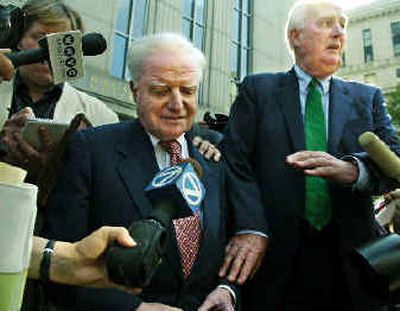Adelphia founder convicted

NEW YORK — Adelphia Communications Corp. founder John Rigas and his son Timothy were convicted Thursday of looting the cable company to line their own pockets and deceiving investors by hiding its backbreaking debt.
A federal jury found each guilty of 15 counts of securities fraud, two counts of bank fraud and a count of conspiracy. The bank fraud convictions alone carry up to 30 years in prison.
A second Rigas son, Michael, was cleared of conspiracy, but jurors remained undecided on the other counts against him. Former Adelphia assistant treasurer Michael Mulcahey was acquitted of all charges.
The convictions were another big win for Manhattan federal prosecutors, whose pursuit of white-collar crime has landed them convictions of Martha Stewart and former star investment banker Frank Quattrone.
But the verdict was devastating news for John Rigas, 79, who founded the company with a $300 license in 1952, took it public in 1986 and built it into a cable titan by acquiring other systems in the 1990s.
He leaned forward in his chair as the verdict was read and did not stand up for 30 minutes after it was finished, receiving hugs in his seat from supporters.
John Rigas and 47-year-old Timothy Rigas, who was Adelphia’s chief financial officer, were acquitted of wire fraud charges.
The jury of seven women and five men delivered its partial verdict on its eighth day of deliberations. The decision came after a four-month trial marked by testimony on complex debt agreements and cable-subscriber numbers.
U.S. District Judge Leonard B. Sand told jurors to return Friday to hear additional instructions, and he said they would then continue deliberating the charges against Michael Rigas, 50, the company’s former secretary.
“Ladies and gentlemen, you’ve been working very hard, and your task is not done,” the judge said.
A lawyer for John Rigas declined to comment as he left the court, saying the trial is unresolved. Jurors are undecided on one element of the conspiracy count, but their guilty verdict against the father and son will stand.
As Timothy Rigas left court, his lawyer, Paul Grand, vowed an appeal and said: “Of course we’re disappointed. We hope we get a better result in another court.”
Andrew Levander, a lawyer for Michael Rigas, said the day was “bittersweet.”
Adelphia, then based in tiny Coudersport, Pa., collapsed into bankruptcy in 2002 after the company disclosed $2.3 billion in off-balance-sheet debt. It now operates under bankruptcy protection in Greenwood Village, Colo.
Prosecutors accused the Rigas family of using complex cash-management systems to send cash around to various family-owned entities and as a cover for stealing some of the money for themselves.
While most of the alleged fraud took its form in hidden debt, the trial was also notable for examples of the eye-popping personal luxury that has marked other white-collar trials.
Prosecutor Christopher Clark led off his closing argument by saying John Rigas had ordered two Christmas trees flown to New York, at a cost of $6,000, for his daughter.
Rigas also ordered up 17 company cars and the company purchase of 3,600 acres of timberland at a cost of $26 million to preserve the pristine view outside his Coudersport home, prosecutors said.
Peter Fleming, Rigas’ lawyer, told jurors that the claim was ridiculous — “If you saw this on ‘Seinfeld,’ you’d double up” — and that the company simply wanted to keep the small town attractive to its employees.
Still, the Adelphia founder stole with such gusto from his company, prosecutors said, that Timothy Rigas became concerned and limited his father to withdrawals of $1 million per month.